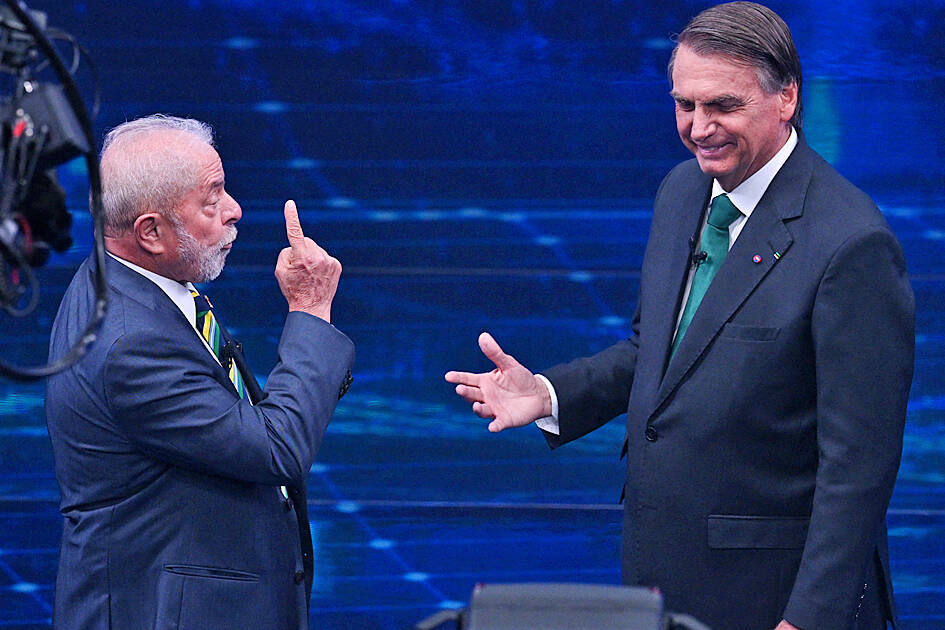Former Brazilian president Luiz Inacio Lula da Silva and Brazilian President Jair Bolsonaro exchanged insults and corruption allegations during a tense televised debate as they sought to sway voters ahead of a runoff election on Oct. 30.
The event organized by Band TV was the first time the two leading candidates met alone face to face, giving them plenty of time to attack each other, as they did not have to share airtime with five other contestants who joined debates before the first-round vote of the presidential election on Oct. 2.
It was a key moment for candidates to reach millions of voters in the final stretch of a tight presidential election, when every vote counts. Both have rushed to secure the backing of contestants who did not make it to the second round, as well as key state governors and mayors who may rally supporters in their states and municipalities. Over the past week, Lula and Bolsonaro crisscrossed Brazil’s northeast to court poor voters.

Photo: AFP
The debate started with the men trying to explain where they would find money to deliver on the promises they have made during the campaign, including more generous cash handouts of 600 reals (US$113) per month to poor people. Both cited a tax reform proposal as part of a strategy to boost government revenue. Bolsonaro said some of the funds obtained with privatizations would also be diverted to fund social programs. Lula said he would reduce the tax burden on poor people and increase it on the wealthy.
It was one of the few times the economy would come into play in the two-hour debate. A long discussion about Bolsonaro’s handling of the COVID-19 pandemic ensued, leaving the president visibly uncomfortable in some occasions. Both called each other a “liar” and “corrupt” several times.
“You’re a liar, the king of fake news,” Lula said. “You discredited vaccines, mocked people dying from lack of oxygen; nobody in the world made fun of the pandemic and death like you did.”
Bolsonaro responded, saying that Lula “did nothing for the country.”
“You only diverted public funds to your pocket and those of your friends,” he said.
Asked whether they would respect the separation of powers and refrain from sponsoring bills to increase the number of justices in the nation’s top court, Lula said that making changes in the court’s composition to appoint friends would be a setback.
However, he conceded that a fixed mandate for the judges instead of lifetime terms could be discussed.
Bolsonaro, who has clashed with Brazilian Supreme Court justices throughout his years in office, coming close to an institutional crisis in some occasions, promised not to sponsor any bill to increase the number of court members.
Lula, who governed the country from 2003 to 2010, won the first round of the vote with 48 percent support. Bolsonaro took 43 percent. Since neither clinched the simple majority needed to win outright, they face off again on Oct. 30.
Lula continues to lead the presidential race although some pollsters say the results would be even tighter than in the first round, when most failed to fully capture support for the right-wing president.

LANDMARK CASE: ‘Every night we were dragged to US soldiers and sexually abused. Every week we were forced to undergo venereal disease tests,’ a victim said More than 100 South Korean women who were forced to work as prostitutes for US soldiers stationed in the country have filed a landmark lawsuit accusing Washington of abuse, their lawyers said yesterday. Historians and activists say tens of thousands of South Korean women worked for state-sanctioned brothels from the 1950s to 1980s, serving US troops stationed in country to protect the South from North Korea. In 2022, South Korea’s top court ruled that the government had illegally “established, managed and operated” such brothels for the US military, ordering it to pay about 120 plaintiffs compensation. Last week, 117 victims

China on Monday announced its first ever sanctions against an individual Japanese lawmaker, targeting China-born Hei Seki for “spreading fallacies” on issues such as Taiwan, Hong Kong and disputed islands, prompting a protest from Tokyo. Beijing has an ongoing spat with Tokyo over islands in the East China Sea claimed by both countries, and considers foreign criticism on sensitive political topics to be acts of interference. Seki, a naturalised Japanese citizen, “spread false information, colluded with Japanese anti-China forces, and wantonly attacked and smeared China”, foreign ministry spokesman Lin Jian told reporters on Monday. “For his own selfish interests, (Seki)

Argentine President Javier Milei on Sunday vowed to “accelerate” his libertarian reforms after a crushing defeat in Buenos Aires provincial elections. The 54-year-old economist has slashed public spending, dismissed tens of thousands of public employees and led a major deregulation drive since taking office in December 2023. He acknowledged his party’s “clear defeat” by the center-left Peronist movement in the elections to the legislature of Buenos Aires province, the country’s economic powerhouse. A deflated-sounding Milei admitted to unspecified “mistakes” which he vowed to “correct,” but said he would not be swayed “one millimeter” from his reform agenda. “We will deepen and accelerate it,” he

‘HYANGDO’: A South Korean lawmaker said there was no credible evidence to support rumors that Kim Jong-un has a son with a disability or who is studying abroad South Korea’s spy agency yesterday said that North Korean leader Kim Jong-un’s daughter, Kim Ju-ae, who last week accompanied him on a high-profile visit to Beijing, is understood to be his recognized successor. The teenager drew global attention when she made her first official overseas trip with her father, as he met with Chinese President Xi Jinping (習近平) and Russian President Vladimir Putin. Analysts have long seen her as Kim’s likely successor, although some have suggested she has an older brother who is being secretly groomed as the next leader. The South Korean National Intelligence Service (NIS) “assesses that she [Kim Ju-ae]